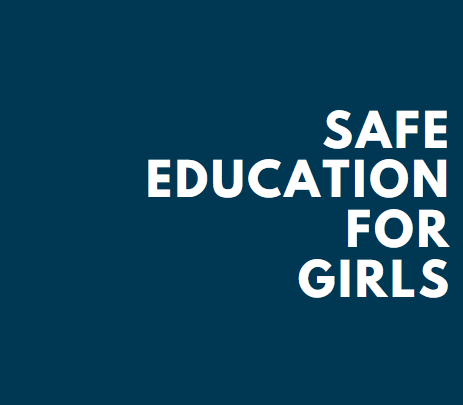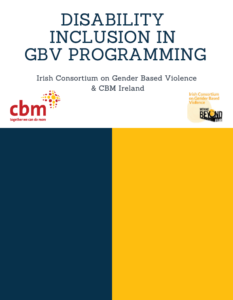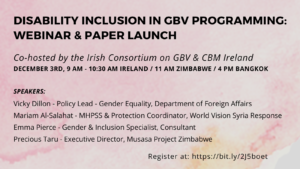
All posts by Róisín Gallagher

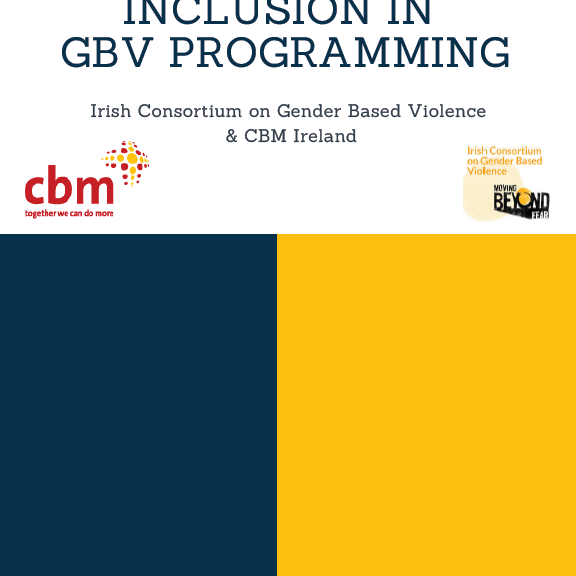
Disability Inclusion in GBV Programming Brief & Recording of Webinar
The Irish Consortium and CBM Ireland hosted a webinar event to mark the launch a new programme learning brief, ‘Disability Inclusion in GBV Programming’.
This paper can be viewed and downloaded here, or by clicking on the icon of the paper below. The recording is also available, at the bottom of this webpage.
To mark the launch of the paper, the ICGBV & CBM hosted a webinar with experts working to improve the lives of women and girls with disabilities globally. The recording of this event is available below, and the captioning transcript can be viewed here.
*NB: Captions accompanying this webinar will be posted shortly.
- Opening Remarks: Vicky Dillon, Policy Lead – Gender Equality, Department of Foreign Affairs
- Moderation: Lou Talbot Beirne, CBM Ireland
Speakers:
- Sharon Matingwina, Program Manager, Musasa Project
- Mariam Al-Salahat, MHPSS and Protection Coordinator, World Vision Syria Response
- Abia Akram, Chair – Asia Pacific Women with Disabilities & CEO – National Forum of Women with Disabilities Pakistan
- Emma Pearce, Gender & Inclusion Consultant, Women’s Refugee Commission
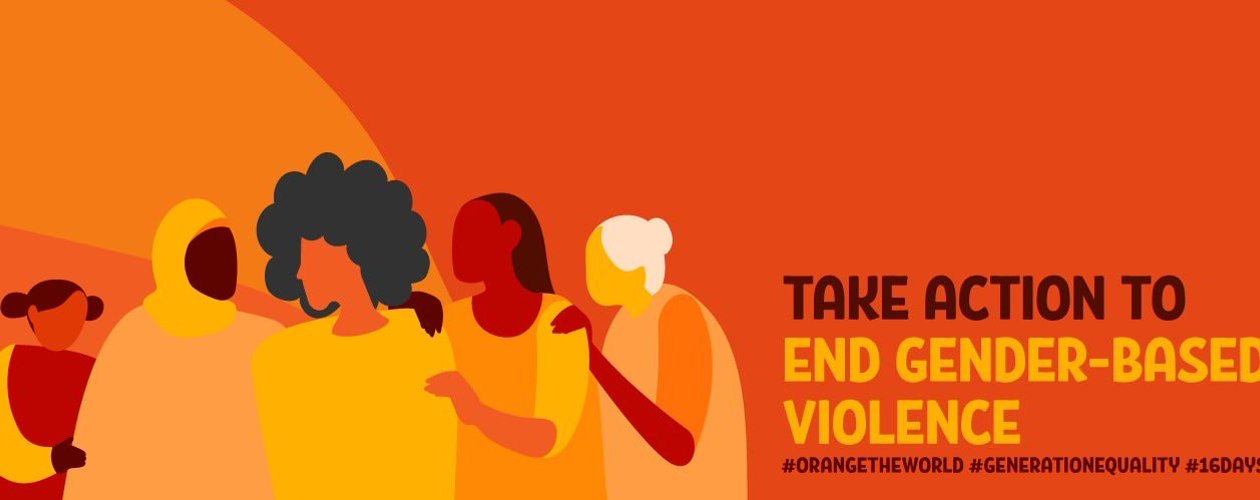
16 Days of Activism – Event Roundup
16 Days of Activism Event Roundup
Is this list missing your event? Email brianna.guidorzi@gbv.ie
November 25th
- Ifrah Foundation – A Girl from Mogadishu & Expert Panel Discussion. 7pm Ireland.
November 26th
- AkiDwA – Gender-based violence: Migrant women’s perspective – 2-4:30pm Ireland.
- World Health Organisation – Innovations in addressing violence against women in the context of COVID-19. 12 – 1pm Ireland.
November 30th
- The New Humanitarian – Seeking justice for survivors of aid worker sex abuse. 1pm Ireland.
- GBV Area of Responsibility – 3:30-5pm Ireland – Introducing The Inter-Agency Minimum Standards For GBV Programming (English, Français, Español and عربى).
December 3rd
- ICGBV – Disability Inclusion in GBV Programming. 9 am- 10:30am Ireland.
- International Center for Research on Women – Working across movements and sectors to end all forms of GBV: Defining Priority Actions for the Generation Equality GBV Action Coalition. 2pm Ireland.
December 8th
- GBV Area of Responsibility – Staff care and support: Combatting burnout and vicarious trauma for GBV staff in the time of COVID-19. 2pm Ireland.
December 9th
- GBV Area of Responsibility – Building capacity on GBV case management: An unprecedented journey across 8 countries. 1-2:30pm Ireland.
- GBV Area of Responsibility – Launch and implementation of the Minimum Standards for GBV in Emergencies (Caribbean Region). 3pm Jamaica.
December 10th
- GBV Area of Responsibility – “For Me, The Justice Is The Truth”: Strengthening Access To Justice For GBV Survivors. 9am Ireland.
Upcoming webinar & paper launch: Disability inclusion in GBV programming
The Irish Consortium on GBV and CBM Ireland are co-hosting a webinar for the launch of a new programme learning brief entitled “Disability Inclusion in GBV Programming.” This webinar will take place on the International Day of Persons with Disabilities and during the 16 Days of Activism against GBV.
This event is open to all, but registration is required here.
We will be joined by several speakers:
Opening Remarks:
– Michelle Winthrop, Policy Director – Irish Aid, Department of Foreign Affairs
Speakers:
– Emma Pierce, Gender & Inclusion Consultant
– Mariam Al-Salahat, MHPSS and Protection Coordinator, World Vision Syria Response
– Precious Taru, Musasa Project Zimbabwe
– Others TBD
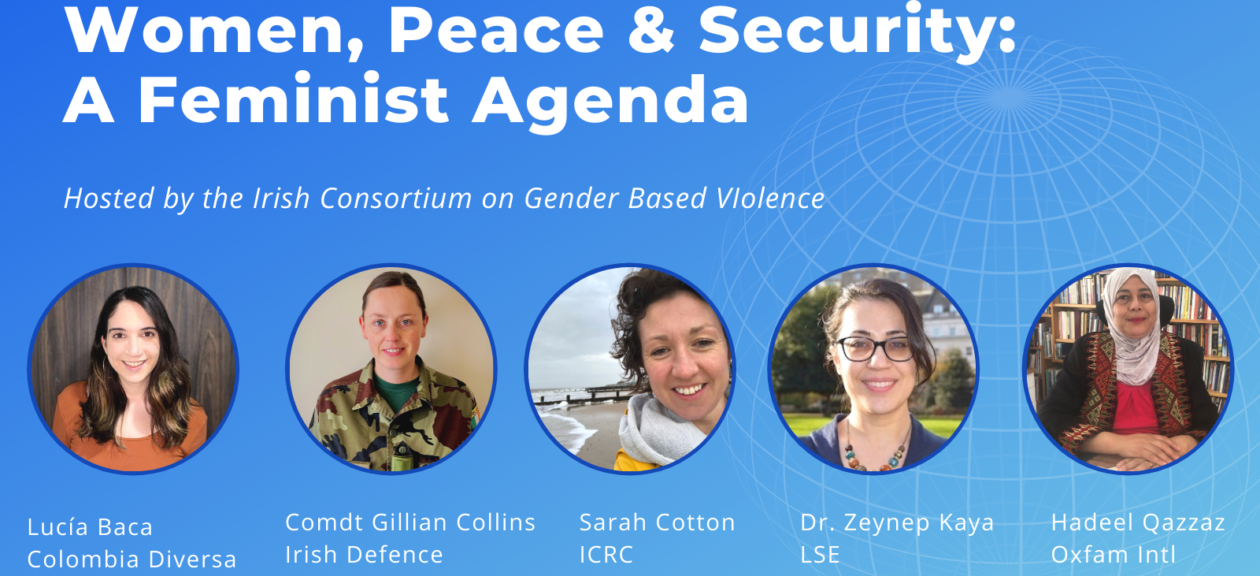
10/11/2020 – Women, Peace & Security: A Feminist Agenda
On November 10th, the ICGBV held an online panel discussion on Women, Peace & Security: A Feminist Agenda. The recording is available above.
Following on from the 20th anniversary of the Women, Peace & Security 1325 Security Council resolution, this webinar explored the WPS agenda from a feminist perspective. In the discussion, panelists shared the ways in which they feel that a feminist agenda might more fundamentally reshape the peace and security sphere as we look ahead to future advancements in WPS, and reflect on successes from 20 years of this agenda.
Moderator – Dr. Caitriona Dowd, Assistant Professor in Security Studies at Dublin City University
Opening Remarks – Áine Hearns, Director of the Conflict Resolution Unit at the Department of Foreign Affairs of Ireland
Panelists:
- Lucía Baca – Coordinator, Peace and Transitional Justice Team, Colombia Diversa
- Sarah Cotton – Public Affairs and Policy Advisor, International Committee of the Red Cross
- Commandant Gillian Collins – Gender Equality and Diversity Advisor, Irish Defence Forces
- Dr. Zeynep Kaya – Associate Academic, WPS Centre, London School of Economics
- Hadeel Qazzaz – Regional Gender Justice Coordinator, MENA, Oxfam International
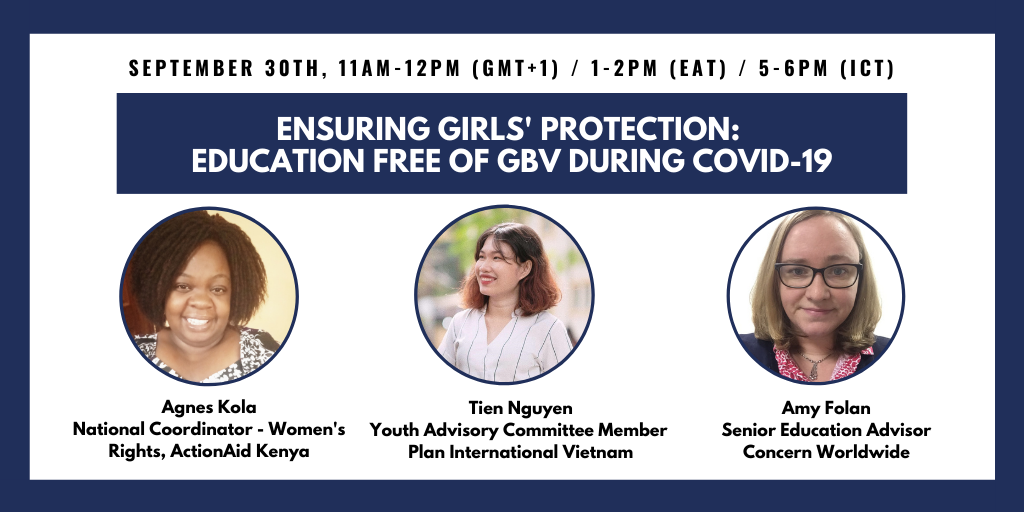
Ensuring girls’ protection: Education free of GBV during COVID-19
On September 30th, 2020 the ICGBV hosted an online Q&A on school-related gender based violence (SRGBV) during COVID-19. Have protection risks changed in the context of the pandemic? What programme adaptations have been necessary? Are there opportunities to ‘build back better’ regarding quality of education and freedom from violence at school? This event followed on from the ICGBV’s learning brief ‘Safe Education for Girls: Tackling School-Related GBV’.
Three panelists informed the discussion:
- Agnes Kola, Women’s Rights Coordinator, ActionAid Kenya
- Tien Nguyen, Youth Advisory Committee Member, Plan International Vietnam
- Amy Folan, Senior Education Advisor, Concern Worldwide
Opening remarks: Siobhán McGee, ICGBV Chair & CEO ActionAid Ireland
Moderated by Brianna Guidorzi, ICGBV Communications and Policy Officer Chat and Abby Ryan, ICGBV Coordinator
30/09/20 – Webinar: Education free of GBV during COVID-19
On September 30th, 2020 the ICGBV hosted an online Q&A on school-related gender based violence (SRGBV) during COVID-19. Have protection risks changed in the context of the pandemic? What programme adaptations have been necessary? Are there opportunities to ‘build back better’ regarding quality of education and freedom from violence at school? This event followed on from the ICGBV’s learning brief ‘Safe Education for Girls: Tackling School-Related GBV’.
Three panelists informed the discussion:
- Agnes Kola, Women’s Rights Coordinator, ActionAid Kenya
- Tien Nguyen, Youth Advisory Committee Member, Plan International Vietnam
- Amy Folan, Senior Education Advisor, Concern Worldwide
Opening remarks: Siobhán McGee, ICGBV Chair & CEO ActionAid Ireland
Moderated by Brianna Guidorzi, ICGBV Communications and Policy Officer Chat and Abby Ryan, ICGBV Coordinator

27/04/2020 – Opinion piece on COVID19 for the Development Studies Association of Ireland
